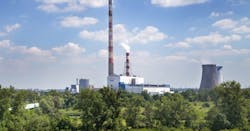Gas-fired CHP plants will replace coal-fired District Heating projects in Poland
A Polish utility and power generator will partner up to finance and build two major district heating power projects in that nation.
The management board of PGE Energia Ciepla and the Wroclaw Combined Heat and Power Plant Group Kogeneracja signed three agreements with the National Fund for Environmental Protection and Water Management (NFOSiGW). The deal co-finances construction of combined heat and power (CHP) plants in Siechnice and Zgierz.
Both projects are designed to move away from coal fuel in the heat generation process at PGE locations. The construction of the new Czechnica CHP plant in Siechnice will replace an existing coal-fired CHP facility by 2024, according to the announcement.
Czechnia CHP’s unit will be gas and steam combined, with a peak load boiler house and a heat accumulator. CHP units deliver both electricity and heating for home use or industrial processes.
Wojciech Dąbrowski, President of the Management Board of PGE Polska Grupa Energetyczna, pointed out that the PGE Group will transition its power and heat generation fleet to 70 percent lower emitting fuels by 2030.
“One of the priorities of the strategy of the PGE Group is the decarbonization of the heat sector,” Dabrowski said in a statement. The co-financing agreements “will enable us to achieve the strategic objects of the PGE Group.”
Related stories
Cogeneration News: New York Wastewater Treatment CHP generates excess power back into the grid
Global Micro-CHP market forecast to grow 20 percent annually
Subscribe to EnergyTech's free, tri-weekly newsletter for more stories like these
The financing amount is estimated at around 352 million Polish zloty ($86.7 million U.S.).
In the years 2023-2029, in the majority of locations where the PGE Group owns its assets, installations will be commissioned which will result in a total or significant departure from coal fuel.
A total departure from coal is first planned in Zgierz, Kielce, Lublin, Rzeszów and Gorzów Wielkopolski, while a significant one in CHP plants in Bydgoszcz, Siechnice, Gdynia and Gdańsk. Gas, municipal waste, biomass, waste heat and renewable energy will be used to produce heat in the new and modernized heat units.
The funds come from the Energy Plus priority program.
